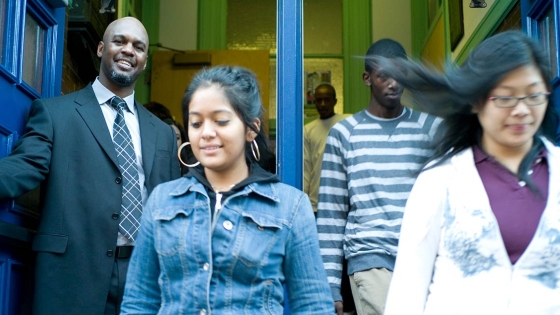DESCRIPTION
This professional development series is designed for ELA and ENL teachers, Transitional Bilingual Education (TBE) teachers, reading teachers/coaches and librarians. It is designed to aid language and literacy specialists in identifying and using culturally-responsive, sustaining texts for language development. Across the two sessions we will focus on providing coordinated instruction across Stand-Alone ENL and ENL/ELA classes taken by Entering through Transitioning ELLs, language development at the word, sentence and passage level with culturally-responsive texts, how to set up the classroom for language development, and how to use culturally-responsive, age-appropriate picture books and chapter books to advance listening, speaking, reading and writing abilities. We will practice identifying language objectives and creating activities to boost second language development as well as explore SEL considerations that are possible with culturally-responsive, sustaining texts.
AUDIENCE
This institute is designed for ELA Teachers of MLLs in Grades 4-8 (ELA teachers, ENL Teachers, Transitional Bilingual Education Teachers, Reading Teachers, Reading Coaches, Librarians)
RESOURCES
As a part of this Institute, Participants will gain access to a Padlet, Filled with Specialized Resources on the Topic
SATURDAY / APRIL 29, 2023 / 9AM-12PM
SESSION I / FOUNDATIONS (OBJECTIVES)
- Why Use Culturally-Responsive Sustaining Texts for Language Development?
- Types of Texts for Language Development
- The Value of Picture Books for Language Development
* What Picture Books Offer for Language Development (Features; Possibilities)
* Finding Appropriate Picture Books for Grades 4-8 (Content, Illustrations);
- How to Use Chapter Books Across ENL/ELA and Stand-Alone ENL
* In ENL/ELA: L1 and L2 Versions; Close Reads of Chapters or Excerpts of Chapters; Chapter Summaries
* In Stand-Alone ENL: Excerpts with a Language Development Focus
- The Value of Poetry for Language Development -
Who are Entering, Emerging and Transitioning MLLs in Grades 4-8?
-
Where to Find and How to Choose Culturally-Responsive, Sustaining Texts
- Types of Culturally-Responsive, Sustaining Texts: Wordless Picture Books, Picture Books, Chapter Books; Poetry; Informational Texts
- Capitalizing on L1 Connections with Culturally-Responsive Books; Translanguaging in Our Texts; Translanguaging in the ENL Classroom -
How ENL Teachers Can Choose a Book(s) for the Stand-Alone ENL Class that Connects with an ENL/ELA Unit (Rather than Use the Same Text)
- By Core Text
- By Theme/Essential Question
- By ELA Unit Objectives
- By Genre
- By Author
- By Standard -
Introducing Our Text Set for this Professional Development Series: Places We Call Home
-
Planning Language Development Around Culturally-Responsive, Sustaining (CR-S) Texts
- Planning Around a Before, During, After Paradigm; It’s Not All About Frontloading
- Considering Language Development Based on Proficiency Level of the Students-What to Work On by Proficiency Level; When Chapter Books Are Appropriate
- Setting Up the Classroom for Language Development—Grouping; Interactivity with/without Technology
- It’s More than Vocabulary
* Defining Language Development At the Word & Phrase Level—It’s More than Teaching Content Words—Teaching Verbs, Adjectives/Adverbs, Prepositional Phrases; Word Families and Lexical Bundles, Connectives
* Expanding the Sentence Types Kids Can Produce (Simple, Expanded, Compound, Complex),
* Handling/Producing Language at a Paragraph/Passage Level
* Identifying Language Development Targets; How to Analyze a Text to Find Language Development Targets
- Choosing Vocabulary (Topical/Theme-Related Terms; General Academic Terms, ELA Content Terms); Teaching Vocabulary & Developing Word Consciousness
- Working on Listening Comprehension; Tying Reading to Writing and Speaking -
Working with Chapter Books
- Pairing Down; Prioritizing What to Work On—Identifying Targets When There’s So Much Language Involved
- Increasing Language Output by Transitioning Students: Getting More Language Out of Our Learners (Prompting, Setting Up Conditions for Extended Production of Language)
- How to look at a Chapter of a Chapter Book to Identify Targets -
Resources for You (Padlet);
-
Preparation for Next Time: What Book Excerpts to Read and Read Aloud to Watch
SATURDAY / MAY 13, 2023 / 9AM-12PM
SESSION II / APPLICATIONS (OBJECTIVES)
Using texts that represent experiences of our students
-
Revisiting Our Text Set for this Series: Places We Call Home
-
Pairing Texts: How to Extend Learning Across Books
- Pairing Across Genre: Picture Book and Poem
- Pairing for Specific Purposes -
Using Artifactual Literacy and Student-Created Texts to Promote Language Development
- Artifactual Literacy: Promoting Literacy with Artifacts
- Using Student-Created Texts as Models -
Strategies for Language Development; Providing Practice for Each Language Domain Using Our Text Set Titles
- Listening Lesson Ideas: Audio/Video Read Alouds and Book/Author Talks and What to Do with Them
- Speaking/Discussion Lesson Ideas (Using a Range of Visual and Verbal Prompts)
- Reading Lesson Ideas (In-Class and At-Home Lesson Ideas)
- Writing Lesson Ideas (Personal Reaction Writing, Summaries, Analytic Writing, Persuasive Writing)
* Using Illustrations and Cover Art to Promote Writing
* Using Quotes to Promote Writing -
Breakout Rooms to Plan for Listening, Speaking, Reading, Writing Practice with a Given Culturally-Responsive, Sustaining Picture Book:
- Breakout 1: Identifying Language Objectives (Vocabulary, Sentence Structures, Grammatical Targets)
- Breakout 2: Planning Listening, Speaking, Reading and Writing Activities -
SEL Considerations with Culturally-Responsive, Sustaining Texts
- Building Empathy and Cross-Cultural Understanding/Appreciation
- Social Justice Considerations—Taking Books Into Action -
Resources for Teachers (Lesson Planning Templates; Proficiency-Based Language Targets; Teaching Strategy Resources)
The NYS Statewide Language RBERN is an approved Sponsor of CTLE pursuant to Section 80-6 of the Regulations of the NYS Commissioner of Education. All participants must fully attend all required parts of the professional development and be actively engaged in the learning process (as demonstrated in the breakout rooms and/or chat discussions) in order to be awarded CTLE credit.

